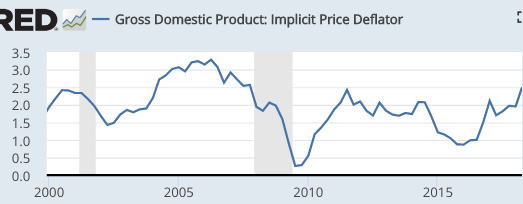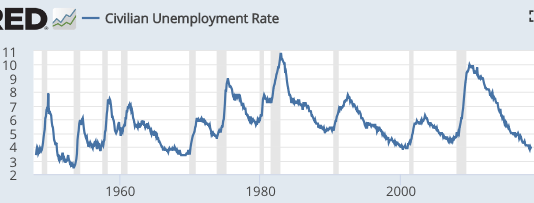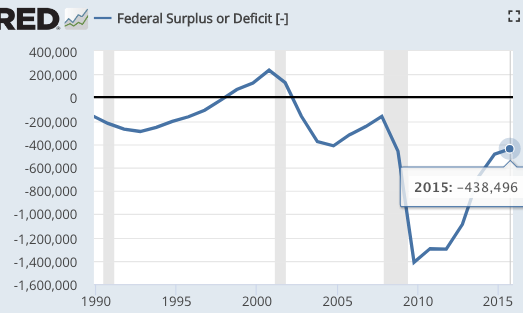This post is highly speculative; take it with a grain of salt.
Traumatic events such as wars are often followed by a backlash. The side that feels vindicated will lash out against those seen as being on the other side. After the Civil War, the radical Republicans went after (moderate) President Andrew Johnson. After WWI, the statists went after the anarchists and pacifists. After WWII (and Korea) you had a wave of anti-communism. After Vietnam, liberal Democrats went after Nixon.
Don’t get bogged down in the details; there are generally broader trends at work. Thus Nixon’s downfall is directly linked to the Watergate break-in, but Nixon was actually attacked for a wide range of abuses, involving domestic spying, war crimes in Southeast Asia, and lots of other stuff. Congress passed laws reining in institutions such as the CIA.
I wonder if the Trump era will fall into this pattern. Obviously there is no major war going on, but at a psychological level it feels a bit like a civil war. Perhaps the Trump era will be followed by the same sort of “reign of terror” as followed earlier traumatic events. Eventually Trump will fall, and the establishment (led by the Democrats) will at some point seek to punish Trump and the administration officials that implemented his policies.
I suspect the “political correctness” movement will play the same role in the 2020s as the anti-communist movement played in the 1950s. Let’s think about some parallels. These backlash movements are often tied to very justified causes, but occasionally overreach. Thus the Confederacy really was evil, but there was overreach in trying to impeach Johnson for not being sufficiently punitive toward the South. Communism really was evil, but there was overreach in going after Hollywood screenwriters. Trump really is evil, but there is occasional overreach in going after people not deemed sufficiently “politically correct”.
Let me use an example that may at first seem off topic, but is actually linked to all the current craziness. The Me-Too movement is a long overdo attack on powerful men who abuse women. And I’d also argue:
1. Trump is a sort of anti-Me-Too figure. (The same could be said for substantial parts of the GOP.)
2. Some liberal anti-Trumpers who are mildly supportive of Me-Too are getting attacked for not being sufficiently closely allied with the Me-Too movement.
The first point is pretty obvious. Trump himself has been accused of abuse by many women, and he frequently defends other men who have been accused of abuse. Many of the women that support Trump are themselves skeptical of Me-Too, and of feminism more broadly.
On the second point, a good example occurred recently with the New York Review of Books. Ian Buruma (editor of the NYRB) agreed to publish a piece by a Canadian media figure that had been accused of abusing 23 women. Buruma was interested in publishing an account of what it was like to be publicly shamed. Not surprisingly, many people were outraged, as they viewed this decision as Buruma allowing the abuser to whitewash his actions in a prestigious media outlet.
I think you can make a good argument that Buruma used poor judgment in this case. On the other hand, the firing of Buruma was clear overreach and not justified by his decision, even if mistaken. Honest people can disagree about how to reconcile the public’s interest in learning the perspective of shamed people, with the public interest in shaming bad people.
I expect the eventual downfall of Trump to unleash a huge wave of political correctness across the country. It’s important to put these sorts of waves into perspective, and not overreact either way. Thus the McCarthy era persecution of the Rosenbergs was justified, whereas the attacks on the Hollywood screenwriters were not. The underlying “cause” of anti-communism was of course quite justified, right up there with the anti-slavery movement of the 1800s and the war on fascism during the 1940s. But, as with any movement full of passionate, self-righteous people, there will be occasional overreach.
It’s quite likely that I’ll eventually become caught in the anti-Trump backlash, as “collateral damage”. This might seem surprising, as I’m among the most outspoken anti-Trumpers in the econ blogosphere. If you are surprised, then you’ve never studied the Chinese Cultural Revolution, where even the devout communists eventually became shamed and persecuted. I’ll eventually become seen as a Trumpian old white male, who just doesn’t “get it”. Someone will dig up my old posts where I mock certain tenets of political correctness, such as the recent hysteria over cultural appropriation.
So why am I not worried about my likely fate? Let’s go back to Trump for a moment. Trump clearly has fascist instincts, and idolizes strong authoritarian leaders. But he’s also enmeshed in an American constitutional system that gives him relatively little power. So he governs as a fairly conventional Republican, except for a few symbolic actions such as the recent trade war. I’ve consistently argued that not much would change under Trump, and so far I’ve been right.
Similarly, although the eventual overreach of anti-Trump political correctness will resemble the Chinese Cultural Revolution on a stylistic level, in fact it will be mostly empty theatre—not mass murder. I’m in the fortunate position where I’m not vulnerable to public shaming. It makes no difference to me if I lose my job–heck I’d love an excuse to retire! I don’t care what others think of my political views; indeed I’ve always been a contrarian thinker. And I don’t follow Twitter, which is where the shaming often occurs. (Others will not be so lucky.)
In the post-Trump era, I’ll cheer the attacks on Trump officials who did abuse government power and I’ll attack the excesses of left-wing PCism where appropriate. Classical liberalism is my lodestar, an ideal that never needs replacement. Both the left and the right have periods where they reject classical liberalism. Right now, the biggest threat in the world is right wing, xenophobic, misogynistic, authoritarian nationalism. And that’s where I focus my attacks. But there will come a day where the biggest threat will be left-wing PCism run amuck, and when that occurs I’ll focus my attacks on that group.
BTW, one aspect of the current moment that is often overlooked is that there is a sort of generational war simmering below the surface. During the 1960s, the hippies were not just horrified by the Vietnam War and racism; they were horrified by the older generation. After all, the older generation had produced the system that the hippies despised. Something similar is occurring with the Me-Too movement. The younger generation is clearly contemptuous of the older generation, at least regarding the sexual harassment issue. And how could it be otherwise? The older generation tolerated these abuses for decades. Indeed someone recently dug up a tape of a “roast” at one of the major networks, where several participants made fun of Matt Lauer’s practice of abusing women. To my generation, this stuff was just a big joke—the “casting couch” phenomenon. How could the younger generation not be horrified by us old fogies, who just don’t get it?
Earlier I referred to the Buruma firing, and this seems relevant:
Were there in-house objections to the piece?
No. We had a proper office discussion and everybody expressed their views and not everybody agreed. But all views were aired and in the end, when the decision was made, the office stuck together.
Was there a gender breakdown during the discussion?
I would say not necessarily just in this particular case. I would say that on issues to do with #MeToo and relations between men and women and so on, there isn’t so much a gender breakdown as there is a generational one. I think that is generally true. I don’t think our office is in any way unusual. I think people over 40 and under 40 often have disagreements about this.
How old are you?
I’m 66
I like Buruma a lot, but he comes off poorly in this interview. People of my generation need to spend some time rethinking their assumptions and at the very least come up with better defenses for their views, assuming they decide not to change their views. (Of course it goes without saying that younger SJWs need to be more tolerant of views with which they disagree.)
I’m already looking past the Trump era, and even past the post-Trump backlash excesses. Its helps to view the past, present, and future from a “timeless perspective”. At least it’s less stressful to see things that way. All things must pass.
PS. Here’s what the NYRB should have done. Hire someone to write an opinion piece on Me-Too. Have them interview a few abusers to get a sense of what it’s like to be shamed, and whether they’ve rethought their attitude toward women. But also include interviews with the women who have suffered emotional trauma from the abuse, to put things into perspective.





